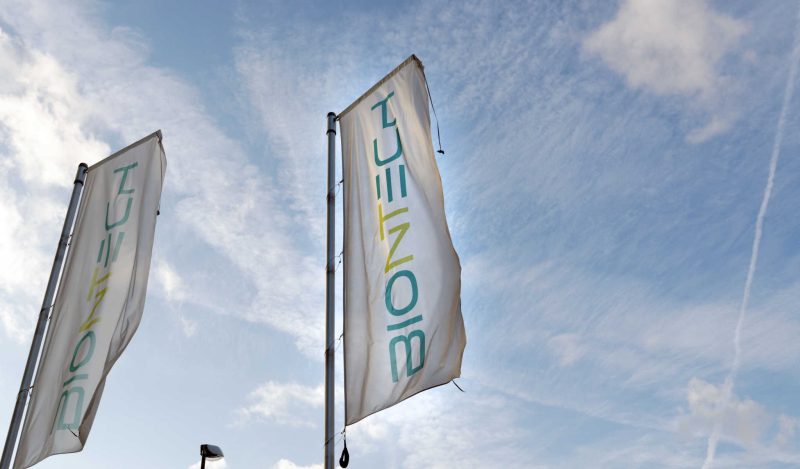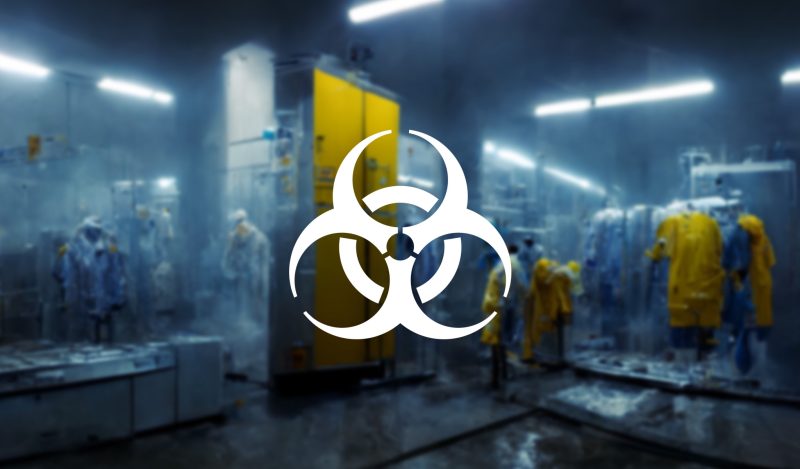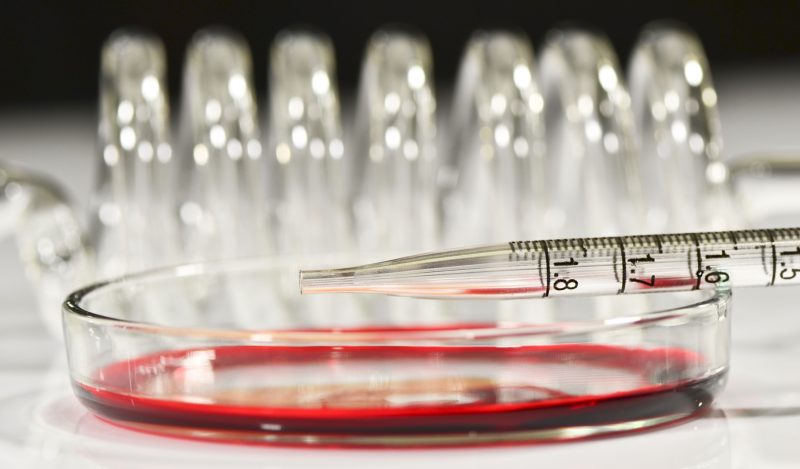So, now that it has been established that the main profiteer in the Covid-19 “vaccine” gold rush of the last two years is not Pfizer, but rather the still astonishingly little-known and previously tiny German firm BioNTech, it would appear that something needs to be said about who owns BioNTech.
As shown in my earlier article here, for 2021 and 2022 combined, BioNTech earned over $31 billion in Covid-19 “vaccine” profits on a whopping 77 percent profit margin as compared to Pfizer’s roughly $20 billion on an estimated 27.5 percent profit margin.
This revelation, however, has led many commentators on social media to suggest that none other than Bill Gates was somehow the main beneficiary of – and presumably eminence grise behind – BioNTech’s astronomic rise or even that BioNTech is a “Gates company.”
While it is true that the Gates Foundation – not Gates personally – invested in BioNTech in a deal that, as will be seen below, was likely brokered by the German government, and while that deal is indeed curious for its timing and some of its details, its purely economic significance has been wildly exaggerated.
As of December 30, 2020, the Gates Foundation’s initial holdings of 1,038,674 BioNTech shares represented a mere 0.43 percent of the company’s total stock, as the below Yahoo Finance chart makes clear.
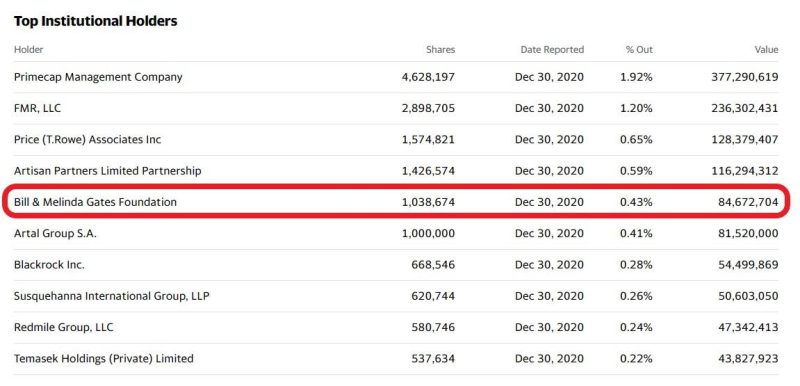
This placed the Gates Foundation among the top institutional investors in BioNTech at the time. But that such relatively paltry holdings could qualify an organization as a top institutional holder is itself indicative of a far lesser-known fact about BioNTech: namely, that it is a very closely held company, the great majority of whose shares are owned by just three people.
Consequently, only a very limited portion of BioNTech shares have ever been available for purchase by the Gates Foundation or anyone else.
The three principal shareholders are CEO Ugur Sahin and Germany’s Strüngmann twins, Andreas and Thomas, who provided much of the initial seed capital for the company’s founding in 2008.
According to BioNTech’s latest annual report to the SEC (p. 192), the Strüngmanns own 105,613,143 shares representing 43.4 percent of BioNTech’s total stock: i.e., literally 100 times more than the Gates Foundation held! Sahin owns 42,262,039 shares representing 17.4 percent of the company’s stock. Together, Sahin and the Strüngmanns thus control nearly 61 percent of BioNTech stock.
The Strüngmanns are AT Impf in the below table. AT Impf is a fully-owned subsidiary of the twins’ ATHOS KG family office. Sahin is the sole shareholder of Medine.

Furthermore, as footnote 1 to the table specifies, “ATHOS KG via AT Impf GmbH has de facto control over BioNTech based on its substantial shareholding, which practically enabled it to exercise the majority of voting rights to pass resolutions at our Annual General Meeting.”
So, in short, BioNTech is not a “Gates company,” but rather literally a Strüngmann company, the Gates Foundation’s stake having always been extremely minor.
As discussed in a much-cited Substack post by Jordan Schachtel, the Gates Foundation has since sold off 890,000 shares in BioNTech, representing 86 percent of its previous holdings. Based on timing and the evolution of the BioNTech share price, Schachtel estimates that the foundation made $260 million on the sale or a whopping 1,500 percent return on its initial investment.
It is this windfall that makes Gates appear like the main beneficiary of BioNTech’s sudden success in the often fact-deprived atmosphere of social media. But, needless to say, the Strüngmanns are the main beneficiaries of BioNTech’s success.
Indeed, as was widely reported in the German media at the time, the precipitous rise in BioNTech’s share price briefly catapulted the twins into the position of the richest people in Germany, with an estimated net worth of €52 billion or $62 billion, when the share price was at its highest in late 2021. Their BioNTech holdings alone were reported to be worth over €42 billion. (See, for example, the report in the German weekly Stern here.)
Of course, the BioNTech share price has since fallen back down somewhat closer to earth. But the twins do not appear to have been averse to getting some cold hard cash out of their investment while the share price was high either.
Thus, circa December 2020, when the Gates Foundation still held all of its initial holdings and 0.43 percent of BioNTech stock, the Strüngmanns twins in fact held 114,410,338 shares or nearly 47.4 percent of BioNTech stock. (See page 201 of BioNTech’s 2020 annual report here.) This means that the twins have in the meanwhile divested themselves not of nearly 900,000 shares, like the Gates Foundation, but of nearly 9 million.
We know, moreover, from other SEC filings that they sold the great bulk of the shares (over 8 million) precisely in 2021, the year in which the BioNTech share price reached its peak. Depending on the exact timing then, they presumably made roughly ten times more than Gates – i.e., a haul of over $2 billion as opposed to the Gates Foundation’s $260 million – and not for the benefit of any non-profit organization, but strictly for their own.
Furthermore, the Gates Foundation was not the only BioNTech partner to have apparently thought better about having too substantial a tie-up with BioNTech in the longer term. So too did none other than the Chinese pharmaceutical company Fosun Pharma.
This is also relevant to our topic, since Fosun – or allegedly even, via Fosun, the Chinese Communist Party! – is likewise often identified in social media posts and by certain commentators as somehow the “real” owner of BioNTech.
It is not and has never been anything of the sort. Rather, as part of its 2020 agreement with BioNTech to commercialize that latter’s Covid-19 vaccine on the Chinese market, it, like the Gates Foundation, acquired a minor equity stake in the German company.
That agreement, however, has largely remained a dead letter, since Chinese authorities have never even approved the vaccine for use on the mainland. This might have something to do with the fact that late last year the Chinese company sold off more than two-thirds of the 1,576,000 BioNTech shares it originally held. Per the calculation of the Chinese market specialists at Bamboo Works, this left Fosun with a mere 0.2 percent stake in BioNTech. So much for Chinese “control” of the company…
What, then, of the famous September 2019, pre-IPO equity deal in which the Gates Foundation acquired its holdings in BioNTech? How did Gates know to invest in a company that had never even gotten close to bringing a product to market, had only ever run losses – and was focused on developing cancer treatments, not vaccines against infectious diseases, to boot! Hardly anyone had ever even heard of BioNTech.
Well, the below image provides a clue.
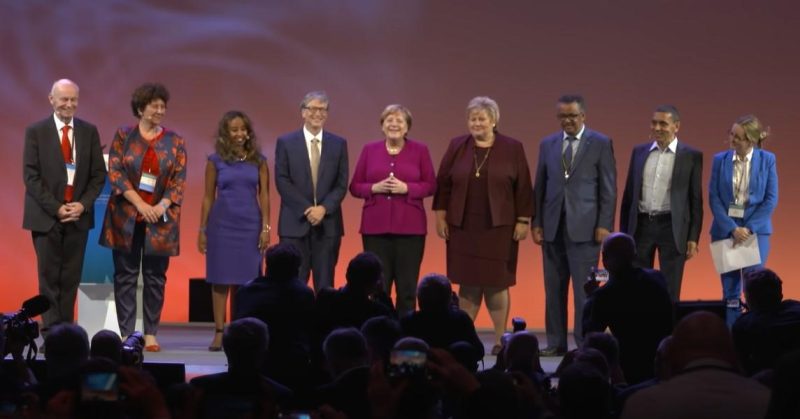
It comes from the closing plenary session of the October 2018 World Health Summit: a German-government-sponsored event, which is held every year in Berlin. (See the World Health Summit “highlight” video here.) The host institution is Germany’s premier university teaching hospital, the Charité, the chair of whose virology department is none other than Christian Drosten. It is Drosten, of course, who devised the famous PCR protocol that the WHO would adopt as the “gold standard” for detecting Covid-19 infections.
In addition to then German Chancellor Angela Merkel at center stage, you will, of course, notice Bill Gates (whose Grand Challenges network co-hosted the session) directly to her right and WHO Director-General Tedros, a bit further away to her left.
But it is the man without a tie directly to Tedros’s left who is of particular interest to us here. For that is none other than BioNTech CEO Ugur Sahin.
It was the 2018 World Health Summit under the patronage of Chancellor Merkel that brought together Gates and Sahin. It is unlikely that Gates had ever heard of Sahin or his company before then either.
The German government, on the other hand, knew Sahin and BioNTech very well. For, as touched upon in my November 2021 article here, the German government was the company’s state sponsor, both sponsoring its very founding and helping to keep it afloat with subsidies during the many years when BioNTech produced nothing.
Published under a Creative Commons Attribution 4.0 International License
For reprints, please set the canonical link back to the original Brownstone Institute Article and Author.
